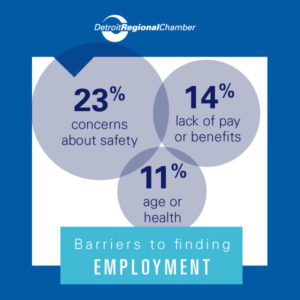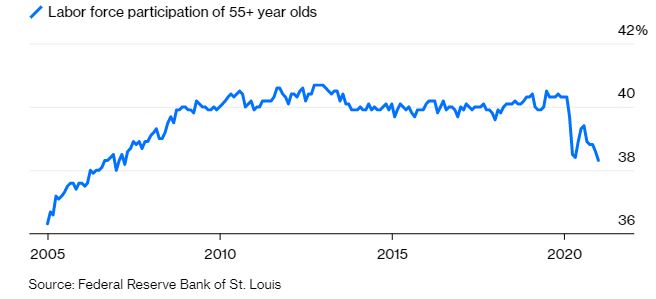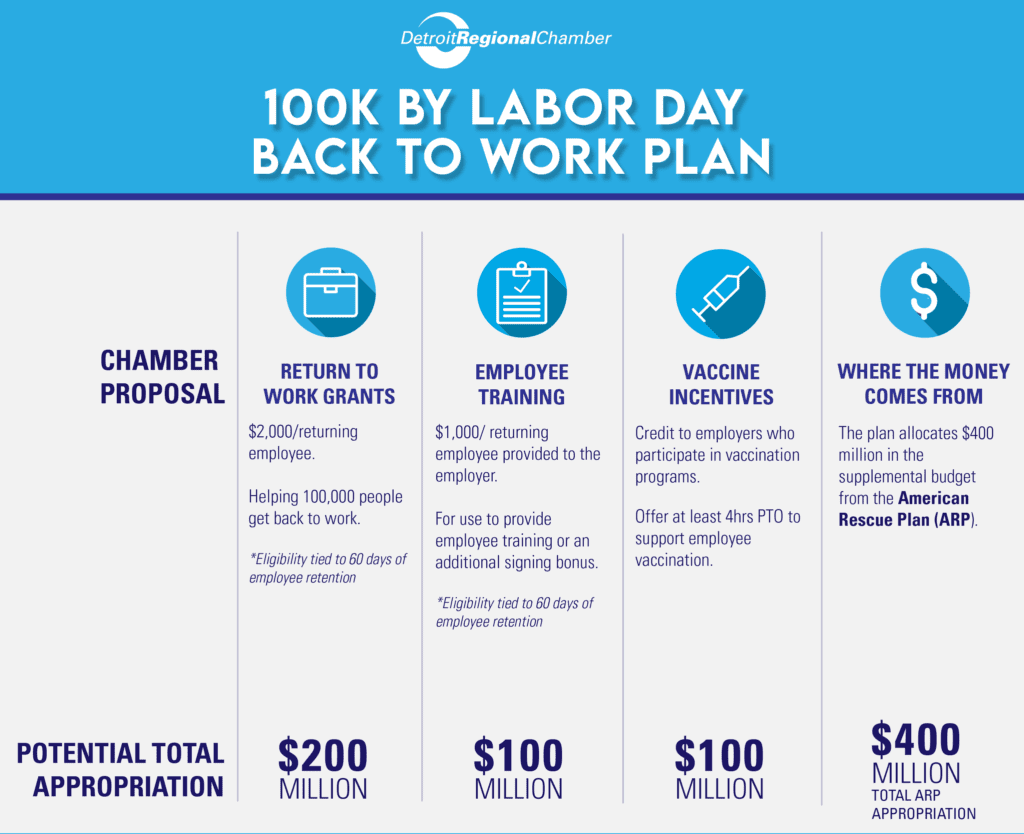New Chamber Poll Provides Key Insights on Automobility Industry Labor Shortage
June 9, 2021What’s Causing the Ongoing Labor Shortage
Michigan businesses, including those in the automotive and mobility sectors, report significant staffing challenges as the economic recovery accelerates. In Feb. 2020, unemployment as at 3.5% in Michigan, and labor force participation was at 61.6%. Unemployment is now at 4.9% (better than the national average of 6.1%), but the labor force participation is at 58.7%, which places Michigan at a troubling 42nd in the nation.
Many businesses automatically point to the generous unemployment benefits as the reason. While the survey finds this is likely a contributing factor, it appears to be less of a factor than some may think. Respondents gave multiple reasons for the continued barriers to finding employment.

- 22.9% said they did not feel safe or cited COVID-19 safety.
- 14.3% said it was a lack of good pay or benefits.
- 11.4% cited their age or health.
- 11.4% said they have not yet been called back to old jobs.
- 8.6% cited general problems in finding open positions.
- 8.6% cited the need for child care.
- 17.1% did not have an answer.
In a mini focus group of poll participants who were employed before COVID-19, but are now out of work, only one in 15 respondents cited unemployment benefits as the reason for not returning to work. The Chamber survey found that 22.2% of those employed before COVID-19, but who were no longer looking for a job were over the age of 50 (13.6% 65 years or older). This tracks with data from the Federal Reserve Bank of St. Louis that shows labor force participation of workers over the age of 55 has fallen 2% since the start of the pandemic, resulting in two million fewer workers nationwide.
 This decline is a new trend in labor force participation and did not happen during the 2008 Great Recession. In fact, from the end of 2007 to the end of 2009, there was a 1% increase in workers over the age of 55. This trend has a particularly harmful impact on the automotive and mobility industry, where National Association of Manufacturers’ data showed that nearly one and four manufacturing workers are age 55 or older before the pandemic.
This decline is a new trend in labor force participation and did not happen during the 2008 Great Recession. In fact, from the end of 2007 to the end of 2009, there was a 1% increase in workers over the age of 55. This trend has a particularly harmful impact on the automotive and mobility industry, where National Association of Manufacturers’ data showed that nearly one and four manufacturing workers are age 55 or older before the pandemic.
Finding Workers Now and Solving the Labor Shortage
Companies nationwide are attracting skilled workers through retention incentives that include flex schedules, paid vacation time, family events, shift work, and competitive pay. However, in a highly competitive labor market, these incentives are only part of the solution. The Chamber and MICHauto have been advocating state leaders to adopt our 100K By Labor Day Back to Work plan, which would use federal stimulus dollars to incentivize unemployed workers to find a job and help employees with training and vaccination incentives.
 Attracting workers this year is a critical first step to ensure that Michigan’s economic recovery is sustainable. However, to secure long-term competitiveness in the global marketplace, our state needs to address the education and skills gap. The Michigan Department of Labor and Economic Opportunity (LEO) estimates that 75% of the jobs of the future will require a post-secondary degree. However, only 48.6% of Michigan adults currently have a two-year, four-year, or professional certificate. Employers have a significant role to play in helping to close that gap through high school apprenticeship programs, supporting fast-track training programs at local community and technical colleges and on-the-job training programs.
Attracting workers this year is a critical first step to ensure that Michigan’s economic recovery is sustainable. However, to secure long-term competitiveness in the global marketplace, our state needs to address the education and skills gap. The Michigan Department of Labor and Economic Opportunity (LEO) estimates that 75% of the jobs of the future will require a post-secondary degree. However, only 48.6% of Michigan adults currently have a two-year, four-year, or professional certificate. Employers have a significant role to play in helping to close that gap through high school apprenticeship programs, supporting fast-track training programs at local community and technical colleges and on-the-job training programs.
With the industry’s long-term future in mind, MICHauto was proud to partner with the Jackson Area Manufacturing Association to announce Michigan’s first Federation for Advanced Manufacturing Education (FAME) program. The FAME program provides students a two-year, debt-free Associate degree to equip students with the skills required for the rapidly evolving manufacturing industry.
Solving the state’s labor shortage requires a nuanced understanding of the causes and a commitment from political and business leaders to invest in talent attraction.

